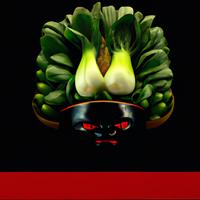
1 serving (200 grams) contains 20 calories, 2.0 grams of protein, 0.2 grams of fat, and 3.0 grams of carbohydrates.

Log this food in SnapCalorie

Nutrition Information
Calories |
8 | ||
|---|---|---|---|
% Daily Value* |
|||
| Total Fat | 0.1 g | 0% | |
| Saturated Fat | 0 g | 0% | |
| Polyunsaturated Fat | 0 g | ||
| Cholesterol | 0 mg | 0% | |
| Sodium | 25.6 mg | 1% | |
| Total Carbohydrates | 1.2 g | 0% | |
| Dietary Fiber | 0.4 g | 1% | |
| Sugars | 0.6 g | ||
| protein | 0.8 g | 1% | |
| Vitamin D | 0 mcg | 0% | |
| Calcium | 63.2 mg | 4% | |
| Iron | 0.7 mg | 3% | |
| Potassium | 100.8 mg | 2% | |
* Percent Daily Values are based on a 2,000 calorie diet. Your daily values may be higher or lower depending on your calorie needs.
Food Attributes
Source of Calories
About Large head of baby bok choy
Large Head of Baby Bok Choy, a staple in Chinese cuisine, is a leafy green vegetable known for its tender texture and mild, slightly sweet flavor. A cruciferous vegetable, it is packed with essential nutrients including vitamins A, C, and K, along with calcium, potassium, and folate. Baby Bok Choy is low in calories but offers a wealth of antioxidants, making it an excellent choice for supporting immune health and reducing inflammation. Its fiber content aids digestion, while its phytochemicals may have cancer-fighting properties. Baby Bok Choy is versatile in the kitchen—ideal for steaming, stir-frying, or adding to soups and salads. However, individuals with thyroid concerns should moderate consumption of bok choy due to naturally occurring goitrogens, which can interfere with iodine absorption. Overall, this nutrient-dense vegetable is a healthy, flavorful addition to a balanced diet.



